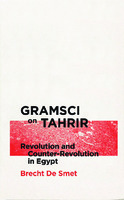Gramsci on Tahrir
Revolution and Counter-Revolution in Egypt
Author(s)
De Smet, Brecht
Collection
Knowledge Unlatched (KU)Number
102188Language
EnglishAbstract
Coming in the wake of intense political and academic debate on the nature and development of the Arab Uprisings, Gramsci on Tahrir zeroes in on the complex dynamic of Egypt's revolution and counter-revolution. It shows how a Gramscian understanding of the revolutionary process provides a powerful instrument for charting the possibilities for an emancipatory project by the Egyptian subaltern classes.
Central to De Smet’s argument is Gramsci’s interpretation of ‘Caesarism’, an occasion in which two evenly matched political opponents reach a potentially catastrophic stalemate; such an interplay between these forces can only end in mutual destruction. In applying this to the Egyptian revolution, we see how the Egyptian state was bereft of strong hegemonies and the people were replete with capable counter-hegemonies. The current situation in Egypt demonstrates how both national histories and global power relations enable, define and displace popular resistance and social transformation.
Keywords
Political Science; Politics; Social Movements; Political Theory; Antonio Gramsci; Egypt; Tahrir Square; Political Activism; RevolutionDOI
10.2307/j.ctt19b9jz2ISBN
9781783713455;9781783713462OCN
1100518430Publisher
Pluto PressPublisher website
https://www.plutobooks.com/Publication date and place
2016-01-20Series
Reading Gramsci,Classification
Revolutionary groups and movements


 Download
Download